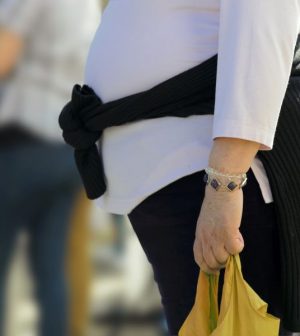- Could Your Grocery Store Meat Be Causing Recurring UTIs?
- Are You Making This Expensive Thermostat Error This Winter?
- Recognizing the Signs of Hypothyroidism
- 10 Strategies to Overcome Insomnia
- Could Artificial Sweeteners Be Aging the Brain Faster?
- Techniques for Soothing Your Nervous System
- Does the Water in Your House Smell Funny? Here’s Why
- Can a Daily Dose of Apple Cider Vinegar Actually Aid Weight Loss?
- 6 Health Beverages That Can Actually Spike Your Blood Sugar
- Treatment Options for Social Anxiety Disorder
Exercise Can Keep Obese Seniors on the Go

Exercise may improve everyday life for even severely obese older adults, a new study says.
Obese seniors can become unable to walk short distances — this is termed a major mobility disorder — and perform day-to-day tasks. Extreme obesity, in particular, may threaten someone’s independence, researchers say.
“Having a major mobility disorder can really affect the quality of life and independence for older
people, but we showed that moderate exercise was a safe and effective way to reduce that risk even in severely obese people,” said lead author Stephen Kritchevsky.
He’s director of the Sticht Center for Healthy Aging and Alzheimer’s Prevention at Wake Forest Baptist Medical Center in Winston-Salem, N.C.
The study included more than 1,600 inactive men and women aged 70 to 89. They were randomly assigned to either a moderate-intensity exercise program or a health education program.
The exercise program focused on walking, strength, balance and flexibility training. The goal: to walk at a moderate pace for 30 minutes and perform 10 minutes of strength training with ankle weights and 10 minutes of balance training in one session.
The participants did two training sessions a week and at-home activities three to four times a week during the two-year study.
Compared to those in the education group, the exercisers reduced the risk of major mobility disability.
The greatest reduction in risk (31 percent) was seen in extremely obese participants, according to the study.
“The inability to walk a quarter of a mile is a proxy for common daily activities, such as the inability to walk a block around the neighborhood or to walk several street blocks to go to a store,” Kritchevsky said in a medical center news release.
Nearly 13 million adults aged 65 and older in the United States are obese, according to background notes with the study.
The findings were published in the July issue of the journal Obesity.
More information
The U.S. Centers for Disease Control and Prevention has more on older adults and exercise.
Source: HealthDay
Copyright © 2026 HealthDay. All rights reserved.










